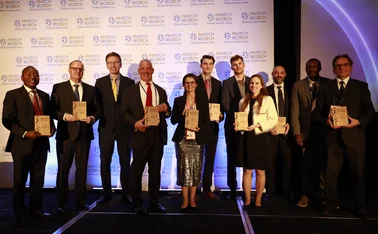
Central bank of the year: The People's Bank of China

The Chinese economy expanded faster than any other major nation in 2013 and its continued growth - albeit at a slower pace than in the past - is vital for the health of the world financial system. The country achieved a growth rate of more than 7% last year against a backdrop of major political change, following the appointment of Xi Jinping as president and Li Keqiang as premier in late 2012. China's new leaders are committed under the Communist Party's 12th five-year plan (2011-2015) to transform the country from an export-driven approach towards a more consumption-based model.
This will be no easy task. But strong leadership and technical competence at the People's Bank of China (PBoC) has already played a critical role in enabling China's transition to a more market-oriented system. In particular, the PBoC has pressed ahead with interest rate deregulation in a bid to ease financial repression in the country. It has also worked hard to rein in excesses in the Chinese financial system, particularly in the shadow banking sector. Meanwhile, capital account liberalisation has continued onshore and offshore through the promotion of renminbi use in both commercial and financial transactions. The PBoC has also significantly advanced plans to offer deposit insurance in China - a move that will help to revolutionise banking in the country.
Tackling financial repression
The Chinese central bank has initiated important first steps to dismantle China's financial repression - a result of the country's longstanding interest rate regulation that sets a floor on banks' lending rates and a ceiling on deposit rates. This has reduced the incentive for banks to make risky ‘on balance sheet' loans. As a result, state-owned banks favour lending to the public sector rather than to private institutions, making it harder for small- to medium-sized enterprises (SMEs) to access finance and for the country to move towards more of an innovative and consumption-based model.
But most banks have circumvented the official lending rules by engaging in aggressive off-balance sheet activities; Chinese banks are now directly or indirectly involved in three-quarters of all shadow finance transaction, according to a report by rating agency Fitch. Banks do this by borrowing funds via short-term wealth management products, which pay relatively high levels of interest, and lending the proceeds to SMEs and other interested parties, many of which are active in longer-term real estate development and local infrastructure projects. Borrowers are prepared to pay a higher rate of interest as they find it hard to secure funds from the banks. But the result is that banks have left themselves exposed to significant maturity mismatches. This makes them more sensitive to interbank liquidity conditions should they need funds in a hurry, with small- and medium-sized banks particularly vulnerable to any significant changes in interbank funding costs.
Zhou probably has one of the most difficult central bank governor jobs in the world, not having adequately sophisticated money markets to work with and not having the necessary authority to exercise, always being required by law to operate under the direction of, and to seek approval from, the State Council before anything significant is done. Yet he is able to command the trust and respect of all concerned
The PBoC has grown increasingly concerned about the situation and chose 2013 to act. The central bank warned market participants in the first half of the year to better manage their assets and liabilities, and to understand they would be left exposed to market discipline should bouts of volatility emerge in the funding markets.
It did not take long for such a scenario to occur.
The conditions for the first flare-up emerged in May and June when commercial banks needed liquidity reserves to meet regulatory capital requirements as well to meet payments and settlements ahead of a public holiday on June 10-12. The banks also lost some of their usual deposit funding as companies moved to make their corporate tax payments before a May 31 deadline. In total, as much as 1.2 trillion yuan ($200 billion) might have been transferred from the interbank market to the PBoC between mid-May and late June.
This caused a liquidity shortfall in the interbank market. But The PBoC stuck to its guns and initially left market forces to work in a bid to ensure banks started to fully understand the risks presented by their aggressive structured lending activities. The aim was to try to reduce moral hazard, to reinforce the message that the central bank was not prepared to provide liquidity backstops to financial institutions at the first sign of any trouble. The central bank's inaction was particularly tough on smaller banks, some of which issued ever-more generous structured deposits in a desperate bid to attract funding, as a liquidity shock emerged that saw the overnight Shanghai interbank offered rate hitting a record 13.4% on June 20 from a low of 2.1%, in early May. The shock in financial markets was amplified by the Federal Reserve unveiling it would be seeking to reduce the size of its quantitative easing efforts in the US, which resulted in large fund outflows from emerging markets.
While the PBoC received criticism from cash-strapped market participants for its lack of intervention, seasoned observers pointed out there was still plenty of liquidity overall in the Chinese banking system despite the rise in interbank volatility. As Central Banking reported at the time, the average reserve ratio for the five largest state-owned banks stood at 20% - the figure was 16.5% for smaller banks. Tao Zhang, International Monetary Fund (IMF) executive director for China, came to a similar conclusion, saying it was "important to emphasise that overall liquidity in the banking system has been adequate, as evidenced by banks'ample excess reserves" when releasing the IMF's annual assessment of the Chinese economy in late June.
"The liquidity squeeze was a reflection of an unsophisticated market panicking under guidance or encouragement from the PBoC to manage their money market books, in particular their funding for loans, properly," says Joseph Yam, former chief executive of the Hong Kong Monetary Authority who is an adviser to the PBoC.
Market stress resurfaces
Interbank markets once again became more stressed in September and then in December. Once more it appears there was adequate base money to serve the liquidity needs of the banks. But one seasoned market observer said a select few banks chose to sit on large excesses of reserves earning just 0.72% and refused to lend to their peers at much higher rates. "It will likely take some time for publicly owned banks operating in China's socialist market economy to be motivated to express market-based managerial behaviour," the official said.
The PBoC ultimately stated on December 20 that it had added 300 billion yuan to the banking system during the previous three days through short-term liquidity operations (SLOs) - essentially buying securities, including its own bills, from banks that promised to repurchase them within a few days.
The relatively slow reaction of the market to the PBoC's cash injection in December could have been the result result of the central bank using SLOs instead of open market operations (OMOs). SLOs have the advantage of being more targeted but are less transparent compared to other market participants, making it harder for the market to fully digest the PBoC's intentions.
While the funding markets showed signs of stress three times last year, ultimately the PBOC can provide as much base money as it takes, through reverse repos, to stabilise rates, rather than always taking a view on whether there is enough liquidity in the system before conducting market operations. At some point moving forward, however, the central bank might need to adopt a prominent monetary policy target rate to guide the market and against which the PBoC can conduct OMOs – and this may happen over the fullness of time.
But by permitting surges in interbank interest rates, the central bank has warned banks that they need to change their aggressive and risky business models to ones that centre more on deleveraging and liquidity management. "The PBoC has been very consistent in sending out the signal to the market, that the drama in June won't be a one-off incident," said Hui Feng, a Central Banking contributing editor and co-author of the book Rise of the People's Bank of China. "By repeating the austerity, the PBoC intends to warn the banks that liquidity prospects will be very tight despite the government's desire to push up the growth rate."
RMB use on track
The PBoC has also continued to play a central role in promoting the use of cross-border renminbi for trade and investment activities.
In March 2013, the Chinese central bank expanded the range of participants that could take part in renminbi settlement of goods for export from a group of pilot enterprises to all enterprises eligible to engage in export/import business. By June 2013, the PBoC issued rules for renminbi settlement of foreign direct investment and,in July, issued guidelines on the opening, use and management of non-resident accounts. More liberalisation in China is expected in the coming months, notable in the Shanghai free-trade zone.
The PBoC also pushed ahead to promote the use of the renminbi around the world, signing a series of currency swap agreements with leading central banks in 2013, including a 350 billion yuan swap line with the European Central Bank and a 200 billion yuan swap facility with the Bank of England. London now looks set to become an offshore centre for renminbi, joining Hong Kong, Singapore and Taiwan. Meanwhile, renminbi-approved clearers ICBC in Singapore and Bank of China in Taiwan also started clearing operations in 2013 to supplement existing offshore renminbi clearing services in Hong Kong already offered for some time by the Bank of China.
Deposit insurance
The PBoC has also worked hard to assist with the introduction of deposit insurance in China - something that has taken a long time to surface in China despite the central bank setting up a deposit insurance division at its Financial Security Bureau some years ago. But developments have picked up during the past year. "Currently the timing is right to roll out a deposit insurance system," the PBoC said in a statement in June last year. "The central bank, along with other government departments, is studying how to improve the plan and will set up a system as soon as possible."
The guarantee of retail deposits up to a ceiling is viewed by many experts as an important backstop to allowing banks to fail, and further market discipline and reform will be required in the years ahead. In its annual staff report, the IMF also urged the PBoC to establish a stable short-term interest rate - such as an overnight interbank repo rate - "as a precursor toward instituting a policy rate", saying that the existing administrative controls on bank credit are "losing effectiveness".
Based on its track record and efforts in 2013 and before, the PBoC appears well positioned to take the relevant action. The ability of the central bank to push through reform during uncertain times, both at home and abroad, is a testament to years of hard work developing its reputation and competence - it was not just handed a monetary policy mandate and operational independence. China's central bank officials have had to work tirelessly within wider government to ensure the central bank is viewed as a vital institution to help meet the aims of the ruling Communist Party.
It has done this by attracting some of the most talented university graduates in China. Its ranks are also bolstered by a number of top officials who have studied overseas, including deputy governor and chief of the State Administration of Foreign Exchange, Yi Gang; deputy director of the PBoC's second head office in Shanghai, Zhang Xin; director of monetary policy department II, Li Bo; and director of the international department, Zhang Tao.
 |
| Zhou Xiaochuan |
By having a talented staff with a reputation for sound thought processes, PBoC policies are more likely to be endorsed by China's leadership. This appears to be reflected all the way to the top, after PBoC governor, Zhou Xiaochuan (pictured), was asked to stay on past his retirement age at the start of 2013. This is because China's leaders viewed a change at the top of the central bank as too big a risk to overall stability at a critical juncture in China's development, despite some strong candidates for the job.
Zhou is viewed as an architect of the partial relaxation of China's exchange rate regime in 2005 and instrumental in leading banking reforms since 2003 as well as in wider financial reforms in areas such as the development of equity and fixed income markets. Under his leadership, the PBoC has also initiated a bold reform of China's interest rates regime in 2012 and the internationalisation of the renminbi since 2010.
"Zhou probably has one of the most difficult central bank governor jobs in the world, not having adequately sophisticated money markets to work with and not having the necessary authority to exercise, always being required by law to operate under the direction of, and to seek approval from, the State Council before anything significant is done," says former HKMA chief Yam. "Yet he is able to command the trust and respect of all concerned."
Only users who have a paid subscription or are part of a corporate subscription are able to print or copy content.
To access these options, along with all other subscription benefits, please contact info@centralbanking.com or view our subscription options here: http://subscriptions.centralbanking.com/subscribe
You are currently unable to print this content. Please contact info@centralbanking.com to find out more.
You are currently unable to copy this content. Please contact info@centralbanking.com to find out more.
Copyright Infopro Digital Limited. All rights reserved.
As outlined in our terms and conditions, https://www.infopro-digital.com/terms-and-conditions/subscriptions/ (point 2.4), printing is limited to a single copy.
If you would like to purchase additional rights please email info@centralbanking.com
Copyright Infopro Digital Limited. All rights reserved.
You may share this content using our article tools. As outlined in our terms and conditions, https://www.infopro-digital.com/terms-and-conditions/subscriptions/ (clause 2.4), an Authorised User may only make one copy of the materials for their own personal use. You must also comply with the restrictions in clause 2.5.
If you would like to purchase additional rights please email info@centralbanking.com







